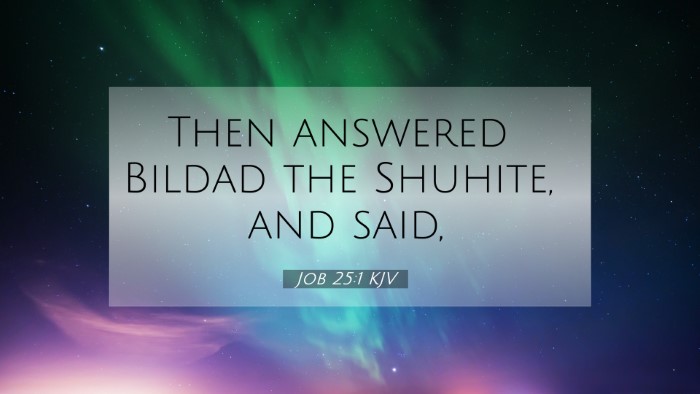Old Testament
Genesis Exodus Leviticus Numbers Deuteronomy Joshua Judges Ruth 1 Samuel 2 Samuel 1 Kings 2 Kings 1 Chronicles 2 Chronicles Ezra Nehemiah Esther Job Psalms Proverbs Ecclesiastes Song of Solomon Isaiah Jeremiah Lamentations Ezekiel Daniel Hosea Joel Amos Obadiah Jonah Micah Nahum Habakkuk Zephaniah Haggai Zechariah MalachiJob 25:1 Similar Verses
Job 25:1 Cross References
Then answered Bildad the Shuhite, and said,
Uncover the Rich Themes and Topics of This Bible Verse
Listed below are the Bible themes associated with Job 25:1. We invite you to explore each theme to gain deeper insights into the Scriptures.
Job 25:1 Cross Reference Verses
No cross reference images were found in our system for this Bible passage.
Job 25:1 Verse Analysis and Similar Verses
Understanding Job 25:1
Job 25:1 states: "Then answered Bildad the Shuhite, and said," which indicates the continuation of the dialogue between Job and his friends, highlighting the intricate relationship between them and the themes of justice, suffering, and the nature of God.
Summary of Commentary Insights
This verse introduces a response from Bildad, one of Job's friends, indicating a shift in the discourse. Bildad's contributions often reflect a rigid understanding of divine justice. His emphasis focuses on the greatness of God and the inability of man to contend with Him.
Albert Barnes notes that Bildad’s remarks emphasize God’s majestic power and the insignificance of humanity in comparison. His arguments serve to assert that, in the face of God’s grandeur, man is but a mere shadow or a fleeting presence.
Matthew Henry elaborates on Bildad's perspective, portraying it as one grounded in a strict interpretation of retribution theology, where good is rewarded, and evil is punished. This view creates a tension in the dialogue, as Job seeks to articulate a more nuanced understanding of suffering and divine justice.
Adam Clarke sheds additional light on the social dynamics within the conversation. Bildad’s approach may reflect the prevailing wisdom of their time, yet it overlooks the personal suffering that Job is experiencing. Clarke suggests that Bildad's perspective lacks compassion and understanding of Job's unique situation.
Thematic Bible Verse Connections
- Job 4:17-19 - This verse discusses the limitations of man, reinforcing the theme present in Job 25:1 regarding human frailty.
- Psalm 8:4-5 - Here, King David reflects on the nature of humanity in the context of God's creation, echoing the sentiments of insignificance found in Bildad's argument.
- Romans 3:23 - This connects to the idea of universal sinfulness, linking back to the humility and acknowledgment of human shortcomings that Bildad emphasizes.
- Isaiah 40:15-17 - Isaiah articulates the greatness of God and the insignificance of nations, similarly mirroring Bildad's point about the absolute power of God over humanity.
- Psalms 90:3-6 - These verses reflect on the transient nature of human life, paralleling Bildad's assertion about the ephemeral state of man.
- Job 14:1-2 - Job himself reflects on human existence and mortality, emphasizing the common theme of fleeting life that responds to Bildad’s views.
- Proverbs 15:3 - This verse highlights God's omniscience and oversight of humanity’s actions, reinforcing the understanding of divine judgment that Bildad implies.
Inter-Biblical Dialogue
Job 25:1 serves as a focal point for inter-Biblical dialogues, particularly when considering how it resonates with teachings found in later scriptures. The verse connects with broader biblical themes of suffering, divine justice, and human vulnerability:
- Connections Between Old and New Testament: The themes of humility before God are echoed in New Testament teachings, particularly in the teachings of Jesus on the nature of humility (Matthew 5:3).
- Bible Verse Parallels: The concept of humanity's smallness before God resonates throughout scripture, from Genesis to Revelation, inviting readers to explore how various authors address humanity's place in relation to the divine.
Tools for Bible Cross-Referencing
To enhance your understanding of Job 25:1 and its context within the Scriptures, here are some tools and methodologies:
- Bible Concordance: A concordance can systematically link verses to explore the frequency and context of themes like divine justice and human frailty.
- Bible Cross-Reference Guide: Utilizing a guide allows readers to identify related scriptures that discuss similar themes, helping to create a broader interpretive framework.
- Cross-Referencing Bible Study: Engaging in a study that specifically focuses on cross-references can illuminate significant connections and the development of biblical theology.
Conclusion
The dialogue encapsulated in Job 25:1 reveals deep theological themes and invites readers to contemplate the nature of God in relation to humanity. Through effective cross-referencing and comparative analysis, one can garner richer insights from the complex tapestry of biblical teaching.


